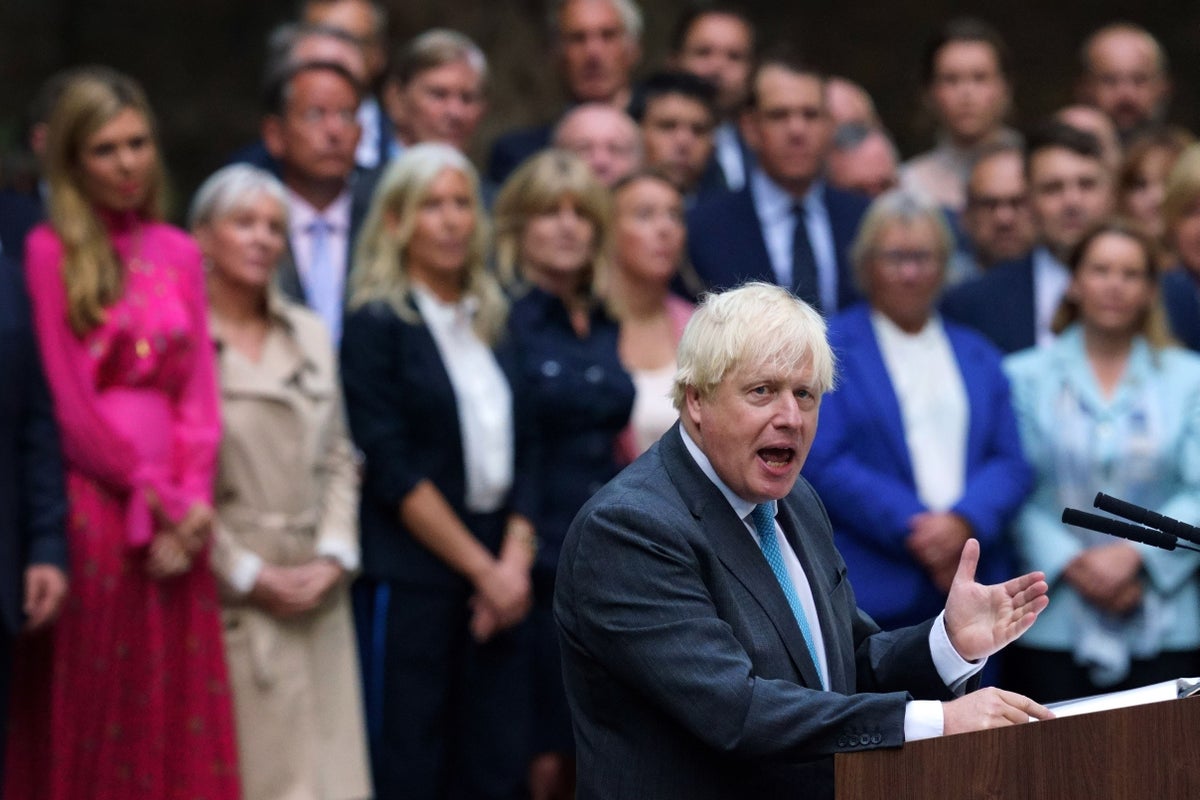
Boris Johnson is planning an unlikely comeback following Liz Truss’s resignation and is sounding out Tory MPs for their support, according to reports.
If he were to return as prime minister, he would be following in the footsteps of his hero Winston Churchill, who returned to No 10 in 1951 after a period in opposition following his 1945 election defeat.
Mr Johnson and Rishi Sunak are currently leading the polls as favourites to replace Ms Truss, who quit after just 44 days in Downing Street.
Mr Johnson is flying back from his Caribbean holiday so that he can muster up the support he needs to reach the 100 MP threshold to join the leadership race.
His former press secretary, Will Walden, suggested on Friday morning that Mr Johnson was not eyeing a return to No 10 because it was in the national interest but rather because it was in “Boris’s interest”.
“The thing about Boris is that he absolutely hates to lose, and I suspect that if he doesn’t think he can get to 100 [votes from MPs needed to join the leadership race], or more importantly he can come second in the first vote - because I think Rishi Sunak is clearly the frontrunner - then he won’t run,” he told Sky News.

Tim Montgomerie, founder of Conservative Home, told Radio 4 that some allies of Mr Johnson already believe there is enough support to get him past the 100 MP threshold. Not only that they think he can get past 140 MPs backing him as prime minister.
Here’s a look at some of the politicians who have made comebacks as prime minister:
Winston Churchill

Winton Churchill returned as prime minister in 1951 but this did not happen as the result of an internal party vote. Sir Winston, as leader of the Conservative party, was elected by the public in the October 1951 general election.
Sir Winston had spent some six years in opposition before his return to government, having being voted out of office in the 1945 general election.
He led the country through the second world war but the Conservative party had become unpopular with the general public. Clement Attlee was elected in 1945 with a Labour majority to lead the country in peace time.
Despite this, Sir Winston still remained a popular figure in the country. In the 1951 general election the Conservative party lost the popular vote to Labour but managed to secure 17 more seats, giving them an overall majority.
Sir Winston remained prime minister until 1955 when he had to resign due to ill health. His deputy Anthony Eden succeeded him as prime minister.
William Gladstone

Although the last year in British politics has been rocky, let’s hope it doesn’t descend into the merry-go-round of the late 1800s - where William Ewart Gladstone served as prime minister on four separate occasions.
He served for 12 years as prime minister, with his career spread over four terms beginning in 1868 and ending in 1894.
None of these terms were consecutive.
The Marquess of Salisbury, Lord Robert Cecil

Robert Cecil was a Conservative politician who served as prime minister three times for a total of over thirteen years.
For two of these stints in the late 1880s he was preceeded and succeeded by William Gladstone each time.
Ramsay MacDonald

Labour’s first prime minister Ramsay MacDonald served in 1924 and again between 1929 and 1935.
He was asked by George V to form a government when Stanley Baldwin’s small Conservative majority proved ungovernable.
In between these stints at the top, he had a period in opposition.
In his second minority government in 1929, he set a precedent by appointing Margaret Bondfield as the first female minister.
Harold Wilson

Harold Wilson came to power in October 1964 with a slim election victory of 4. This increased significantly after a second general election in March 1966.
Like Liz Truss, he had to deal with a Sterling crisis and Wilson was forced to devalue the pound in November 1967.
He called a general election in June 1970, mistakenly believing that his popularity had increased, and suffered defeat to the Tories under Edward Heath.
Wilson stayed as Labour leader while the party was in opposition and returned to No 10 when the February 1974 election resulted in a hung parliament.







